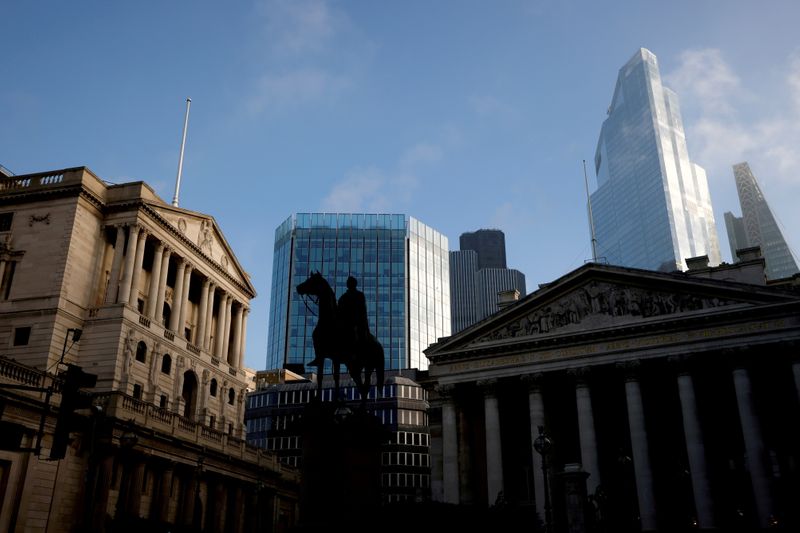By Dhara Ranasinghe and Saikat Chatterjee
LONDON (Reuters) - The Reserve Bank of New Zealand on Wednesday said it would halt its pandemic-induced quantitative easing programme, becoming the latest major central bank to start exiting emergency stimulus.
Canada's central bank meanwhile cut its weekly bond purchases, taking a further step to dial back its stimulus.
As major economies bounce back thanks to COVID-19 vaccination campaigns and an easing of lockdown restrictions, a debate about dialling back emergency stimulus is underway.
Here's a look at who is tapering, who may raise rates first and who might be the last to call time on pandemic-era money-printing.
Central bank balance sheets https://fingfx.thomsonreuters.com/gfx/mkt/qzjpqxzdzvx/Cbanks1407.PNG
1/NORWAY
Norges Bank is at the vanguard in terms of signalling a retreat. It could hike its key policy interest rate twice in the second half of this year and also twice during the first half of 2022, central bank Governor Oeystein Olsen said last month.
Its key rate is at a record low 0% and looks set to rise in September.
This outlook has made the crown one of 2021's best-performing G10 currency. The central bank doesn't intervene in bond markets, so the taper debate is not applicable.
MajorFx https://fingfx.thomsonreuters.com/gfx/mkt/dgkplryqrpb/MajorFx.JPG
2/ NEW ZEALAND
The RBNZ on Wednesday kept its official cash rate at 0.25% but cut short a NZ$100 billion ($70 billion) bond buying programme, sending the Kiwi dollar soaring as markets bet that a rate hike was now imminent.
In fact, some economists now reckon New Zealand could lift rates as early as August, which would put the country at the forefront of developed economies in tightening policy.
New Zealand's economy bounces back https://fingfx.thomsonreuters.com/gfx/mkt/nmopaxaomva/NZECONOMY1407.PNG
3/ CANADA
The Bank of Canada, which announced tapering in April, on Wednesday said it would cut its weekly net purchases of government bonds to a target of C$2 billion ($1.6 billion) from C$3 billion.
It held its key rate at a record low of 0.25% and committed to keeping the rate unchanged until economic slack was absorbed. This is expected to happen some time in the second half of 2022.
4/ UNITED STATES
The Federal Reserve in June began closing the door on its pandemic-era stimulus. Officials moved their first projected rate increases to 2023 from 2024.
The Fed also opened talks on how to end crisis-era bond-buying, adding that the 15-month-old health emergency was no longer a core constraint on U.S. commerce.
But Fed bond buying is set to remain significant for some time, which is supportive for bonds.
An earlier liftoff https://fingfx.thomsonreuters.com/gfx/mkt/ygdpzxgzwpw/Pasted%20image%201623877277274.png
An earlier liftoff https://fingfx.thomsonreuters.com/gfx/mkt/azgvoodqnvd/Pasted%20image%201623877421073.png
5/ AUSTRALIA
Australia's central bank last week took its first step towards tapering stimulus. It retained the April 2024 bond for its three-year yield target of 0.1%, and announced a third round of its quantitative easing programme, albeit at a smaller size.
While it reiterated that the 0.1% cash rate needed to remain unchanged until 2024 to boost inflation, market pricing suggests the possibility of a rate rise in late-2022.
6/ BRITAIN
The Bank of England is reluctant to step away too soon from aggressive stimulus. While it believes inflation could surpass 3% as Britain's locked-down economy reopens, it also expects the climb further above its 2% target to be temporary.
In May, the BoE slowed its bond-buying to 3.4 billion pounds ($4.8 billion) a week, from 4.4 billion pounds. It kept the total size of the bond-buying programme unchanged at 895 billion pounds, with Governor Andrew Bailey stressing the move did not amount to tapering.
7/ SWEDEN
Swedish inflation is just above the Riksbank's 2% target but the central bank believes inflation has peaked.
Policymakers have said rates would stay at 0% for years, warning against withdrawing support too quickly. A 700 billion crowns ($84 billion) asset purchase programme is scheduled to expire at end-2021.
8/ EURO ZONE
The ECB is sticking with an elevated level of bond buying and should be one of the last major central banks to hike rates.
As the economy rebounds some policymakers are making the case to start discussions about rolling back the 1.85 trillion euro ($2.21 trillion) Pandemic Emergency Purchase Programme (PEPP), scheduled to run until at least end-March.
Under a strategy review unveiled last week, the ECB will now target inflation of 2% and is expected to stick with an ultra-easy monetary policy stance to achieve that goal.
Weekly PEPP https://fingfx.thomsonreuters.com/gfx/mkt/bdwvkomnrvm/Weekly%20PEPP.JPG
9/ JAPAN
The BOJ is expected to keep its money spigots wide open to support a fragile recovery, reinforcing expectations it will lag counterparts in reversing crisis-mode policies.
But even in Japan, which has battled with deflationary forces for years, a policy shift debate has started.
Former central bank executive Eiji Maeda said the BoJ could in 2023 start debating ways to phase out its extraordinary stimulus, such as ending negative interest rates.
10/ SWITZERLAND
The Swiss National Bank plans to keep monetary policy ultra-loose for the foreseeable future and believes projected higher inflation is no reason to change course.

The SNB's Andrea Maechler believes the SNB "is not anywhere close" to starting a normalisation of its expansive monetary policy.
The SNB does not intervene in domestic bond markets, instead capping the Swiss franc through foreign exchange interventions. It spent just 296 million Swiss francs ($321 million) on foreign currencies during the first three months of 2021, massively scaling back market interventions as the global economy recovers.